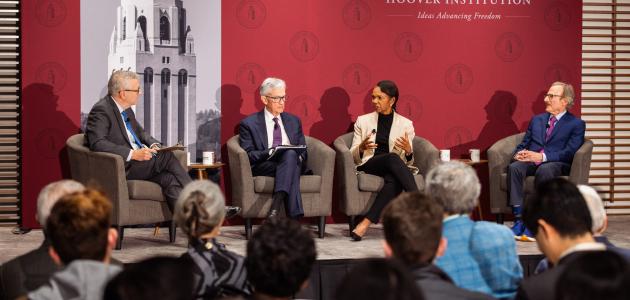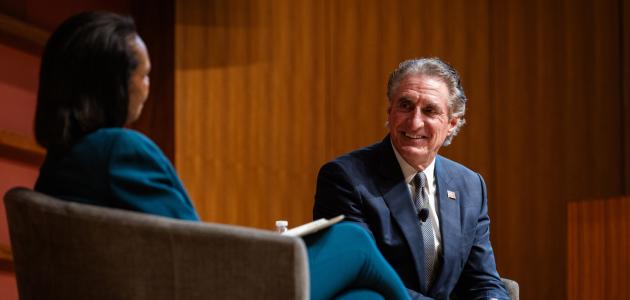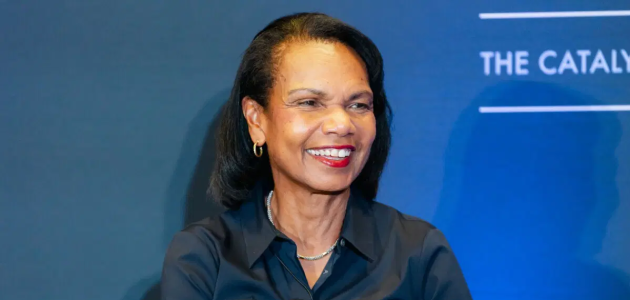In this edition of the Technology Policy Accelerator Newsletter, Hoover Institution Director Condoleezza Rice appears on the Big Technology podcast with Alex Kantrowitz to discuss US research funding and frontier technology. Herbert Lin and Martin Giles discuss how emerging technologies take shape. And Elizabeth Economy and Amy Zegart break down the scale of DeepSeek’s AI success on a new episode of the China Considered podcast.
Highlights

Condoleezza Rice: US Tech at Risk Amid University Cuts, China Threat
Hoover Institution Director Condoleezza Rice joined the Big Technology podcast to discuss whether the United States can hold its technological edge as China races ahead in AI, batteries, and advanced manufacturing. Rice shares her candid assessments of America’s tech arms race with China, the ripple effects of chip export controls, and why she believes democracies are safer stewards of frontier technologies than authoritarian states. Rice and host Alex Kantrowitz also discuss the squeeze on university research funding, immigration-driven talent pipelines, and tuition-fueled class divides. This timely conversation offers a data-rich, no-fluff analysis of the US tech industry and the risks it faces in our current political environment. In the episode, Rice emphasizes the work of the Stanford Emerging Technology Review, a Stanford and Hoover effort dedicated to helping policymakers seize opportunities associated with emerging technologies.
Watch their conversation here.

How Emerging Technologies Take Shape
“Policymakers and business leaders need to remember that impactful innovation doesn’t just take place at the frontier,” argues Research Fellow Herbert Lin, director of the Stanford Emerging Technology Review (SETR), in an interview for Defining Ideas. “For example, when the batteries in electric cars reach their end of useful life, there’s still some capacity left in them that could be useful for other applications. There’s increasingly interest in using secondhand car batteries for storing electricity produced by renewables such as solar power.” Speaking with Policy Fellow Martin Giles, executive director of the Technology Policy Accelerator, Lin discusses the importance of studying "crosscutting themes" across emerging technology areas. Those themes include nontechnological influences on tech evolution, including issues such as social acceptability and media hype, and the dangers of “frontier bias,” which can lead policymakers to overestimate the benefits accruing from leading-edge innovations and underestimate those accruing from ones not on the technical frontier, such as the secondhand electric vehicle batteries mentioned above. He also explains why the 2026 edition of the SETR report will include technical standards as a crosscutting theme, highlighting the opportunities and challenges they pose for governments and businesses.
Read more here.
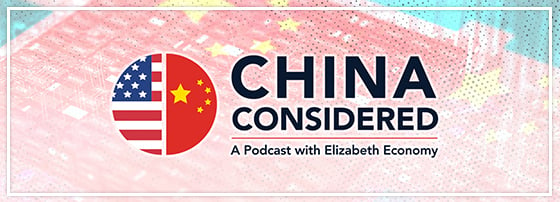
China’s AI Breakthrough: DeepSeek vs. American Dominance with Amy Zegart
On the latest episode of China Considered, senior fellows Elizabeth Economy and Amy Zegart discuss DeepSeek AI, the “Sputnik moment” it created earlier this year when its new AI models appeared to match more costly American ones in performance, and Zegart’s own work tracing the educational backgrounds of the firm’s array of researchers. The fellows explore the strategic implications of open versus closed AI models, arguing that the US should embrace more open research approaches rather than closed models. They highlight how China is successfully replicating America's historical innovation model—investing heavily in long-term basic science—while the US has reduced federal R&D spending.
Watch or listen to the episode here.
More Insights
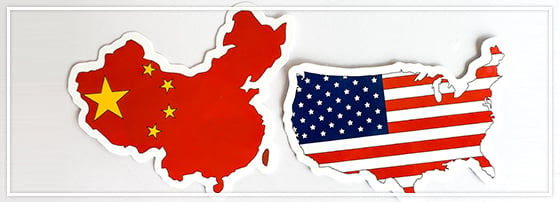
DeepSeek Talent Research Featured in Senate Report, Wall Street Journal
Zegart’s research into the talent profile of Chinese firm DeepSeek AI was featured in the July 2025 edition of the US Senate Foreign Relations Committee’s Minority Report and a news article in the Wall Street Journal. In a section highlighting the growing capabilities of China’s domestic science and research sector, legislators cite Zegart’s April 2025 report, coauthored with Emerson Johnston, showing that only a quarter of DeepSeek’s known research contributors had any ties to US universities, firms, or research institutes, and that more than half of DeepSeek’s team has never left China for studies or for work. This fact also made its way into a new article from Raffaele Huang and Liza Lin of the Wall Street Journal, that ran on July 29 and deals with how China is ramping up its efforts to compete with the US to develop artificial intelligence.
Read more here.
About the Technology Policy Accelerator
The Hoover Institution’s Technology Policy Accelerator conducts research and develops insights that help government and business leaders better understand emerging technology and its geopolitical implications so they can seize opportunities, mitigate risks, and advance American interests and values.
About the Stanford Emerging Technology Review
The Stanford Emerging Technology Review is a product of a major Stanford education initiative that provides an in-depth explanation of pivotal tech domains, recent developments within them, and what to look out for in the future.

















